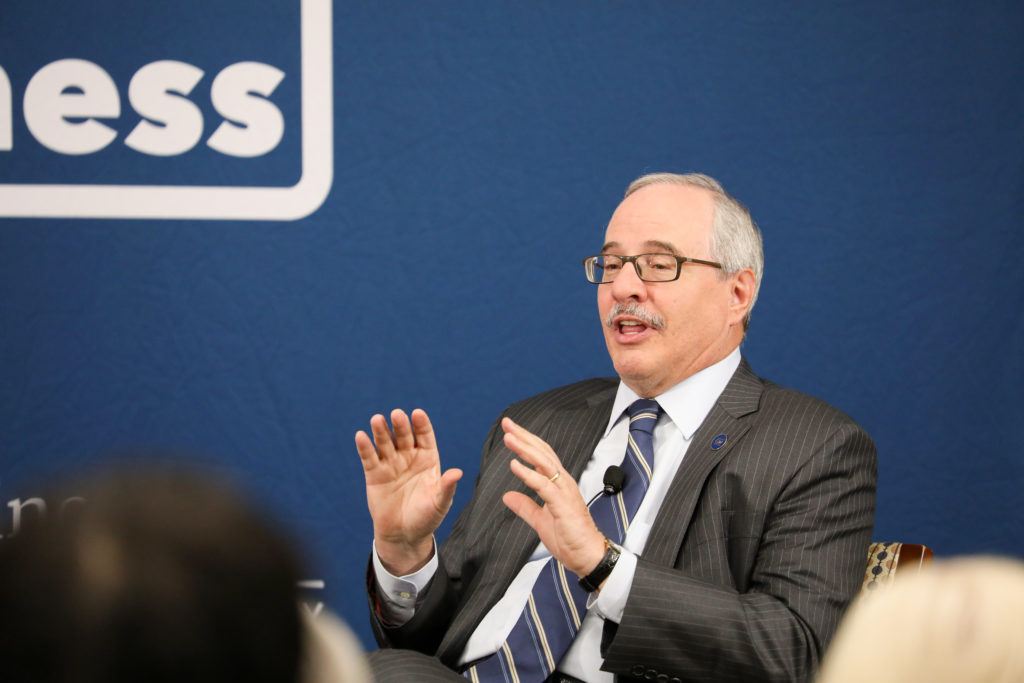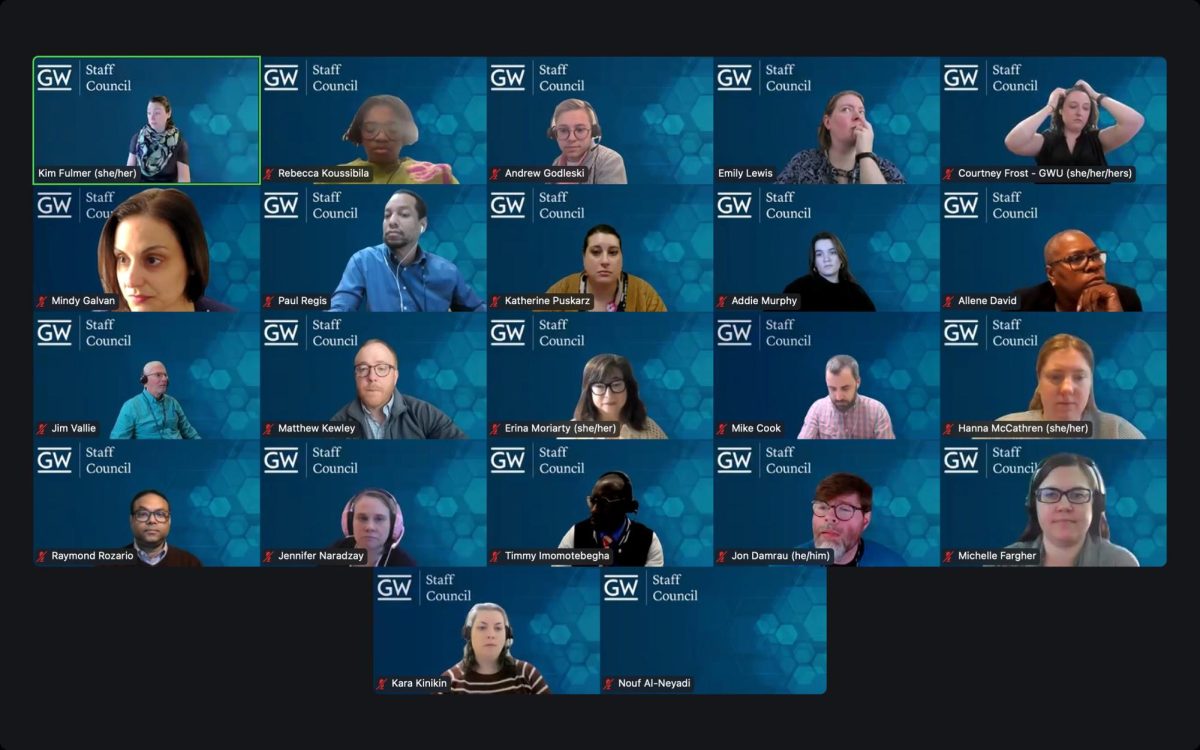The four committees guiding GW’s next strategic plan issued reports late last month detailing their initial recommendations after four months of meetings and soliciting feedback.
University President Thomas LeBlanc announced four pillars in September – world-class faculty, high-quality undergraduate education, distinguished and distinctive graduate education and high-impact research – with corresponding committees that will guide the process to create GW’s next five-year plan. The interim reports mark the midpoint of the committee planning process, which will wrap up in May.
Each committee’s written report outlines the current state of the committee’s purview, recommendations for officials and the guiding principles behind those recommendations.
Here are some key takeaways from the reports:
World-class faculty
The world-class faculty committee developed two primary goals – “faculty excellence and diversity” and “distinguished faculty” – along with five guiding principles and six initiatives based on community feedback and forums.
“Our recommendations and priorities reflect one overarching aim – to position GW as a center of ever-increasing excellence in learning, innovation and ideas and as a magnet for strategic investment for the future,” the committee wrote in its report.
The report states that faculty are “substantially less likely” to report high satisfaction with GW’s “intellectual life” and faculty research, based on the results of the 2019 Colonial Group Faculty Survey.
“This should disturb us all, since it is evident to our own faculty that we could be a far stronger institution,” the report states.
Scott Kieff, a law professor and the committee’s chair, said the survey was originally conducted last year by a group of faculty at the request of the provost.
“It was a significant amount of effort that faculty had already mustered, and because our committee was focused on faculty, we wanted to base it on that significant effort and hear their insights,” Kieff said.
The committee’s suggestions include establishing a Center for Faculty Excellence, which will recommend ways to support the “recruitment and advancement of high-impact faculty” across GW. The report also suggests officials create more faculty recognition opportunities and a faculty mentorship program.
GW currently offers three University-wide honors for tenured faculty, one award for full- and part-time faculty and one award for graduate teaching assistants, according to a University website. Officials also host a Faculty Honors Ceremony each year at the end of the spring semester to recognize winners of those awards and others.
Committee members advocate for hiring “high-impact” professionals as distinguished visiting faculty or distinguished professors of the practice and creating a University-wide hiring plan focused on diversity in the report.
“I know this was a real sprint – everyone on the committee worked hard together, and our work as a committee was greatly benefited from other committees, faculty and groups on campus,” Kieff said.
High-quality undergraduate education
The undergraduate committee’s report identified challenges like negative perceptions about introductory STEM courses and variation in the quality of academic advising and student support across schools. A Student Association survey found in 2018 that advisers lack personal connections with students, and the Columbian College of Arts and Sciences recently overhauled their advising system to assign students with individual advisers.
“GW can do more as an institution to support student success for all, and it can strive to eliminate silos to permit and encourage students to pursue educational opportunities across schools and programs,” the committee wrote in its report.
The committee recommended in its report that officials develop one-credit “pop-up” courses and interdisciplinary “discovery tracks” to help students explore different fields as well as encourage experiential opportunities, like internships and study abroad programs.
Other recommendations include launching “interdisciplinary, problem-based” courses and linking STEM offerings to GW’s strengths, like public policy and the arts, according to the report.
The committee also recommended officials set a standard for advising by creating a “University-wide first-year experience,” lowering the student-to-adviser ratio in some schools and rearranging the freshman year schedule for STEM students to be more “supportive” and increase retention. SA leaders have previously pushed for a first-year experience course.
Gayle Wald, the committee chair and American studies department chair, said the report provides “strong” recommendations about how to elevate STEM at GW and how to leverage existing resources to enhance the undergraduate experience. Officials are seeking to increase the proportion of STEM majors from 19 percent to 30 percent.
“My committee is looking forward to receiving input from the wider community on our first draft of the strategic report,” Wald said in an email. “We know no brief report can possibly speak to everyone’s concerns, but we will continue to listen to all of the input we receive.”
Distinguished and distinctive graduate education
The graduate committee found that graduate students are “generally satisfied” with their experience at GW and their academic programs but are less impressed with aspects of the University like mental health services and financial assistance.
“GW lacks strategic focus in fostering excellence in graduate education, promoting cross-school synergy and interdisciplinarity, and advocating for graduate students,” the committee’s report states.
The committee developed eight criteria, like a well-defined mission and student satisfaction, to evaluate graduate programs. Committee members also recommended that officials strengthen their reviews of doctoral and master’s programs by incorporating the criteria.
The report also identifies a goal of making the planning of graduate programs more “strategic” and “coordinated” by appointing a vice provost for graduate studies, focusing on providing additional interdisciplinary programs and improving financial accounting, like ensuring a “sound and uniform” method of analyzing revenues.
Carol Sigelman, the psychology department chair and the chair of the committee, said the proposed vice provost position would raise the “visibility” of graduate education and convince other offices throughout the University to be more responsive to graduate student needs.
“We have a whole slew of things that this new person can take on as soon as they’re hired,” Sigelman said. “That’s what we think will really allow some new developments in graduate education and improvement and quality.”
She added that her committee made the recommendations outlined in the report based on the input of deans and participants at the public forums, which were held throughout the fall.
High-impact research
The research committee identified five principles – preeminence, identity, ecosystem, leadership and diversity – and three aspirational goals – investing in people, ideas and infrastructure – as the foundation for the committee’s work.
The report states that the short timeline the committee had to create its report – September to January – has created a “major limitation” on the committee’s work. Officials delayed a vote to approve the strategic plan from May to June following concerns over the length of the planning timeline.
The committee recommends the establishment of an academic research leadership team to oversee the long-term growth of GW’s research ecosystem. LeBlanc identified improving GW’s research presence as one of his top five priorities as University president, and officials are currently implementing recommendations provided by a faculty-led research ecosystem review last April.
“One of our major recommendations is that our committee should represent the first step to a faculty academic research leadership team that we believe will be a critical component of the successful implementation of the university research strategic plan,” the report states.
The committee’s recommendations also include establishing a GW research academy to stimulate research and building a centrally located faculty research center.
Alan Greenberg, the chair of the epidemiology and biostatistics department and the committee’s chair, said he hopes the University community will provide input to the committee online and in-person as the planning process moves forward.
“Our committee is very much looking forward to receiving feedback from the GW community through the online portal and upcoming town halls so we can continue to revise and improve the recommendations,” he said in an email.
Makena Roberts contributed reporting.





